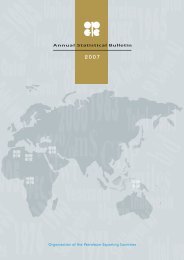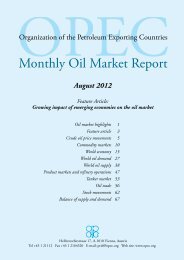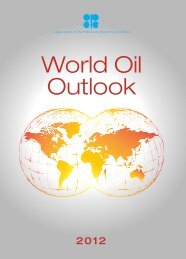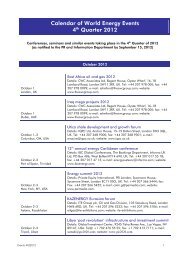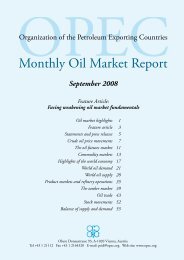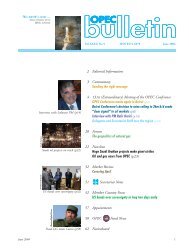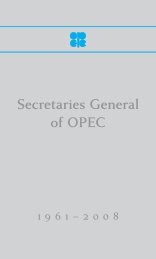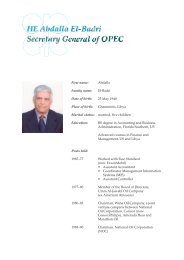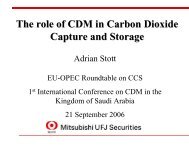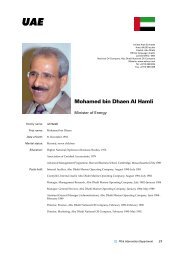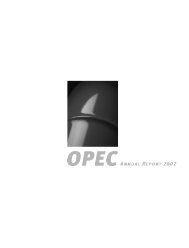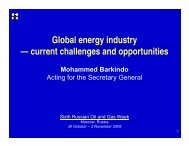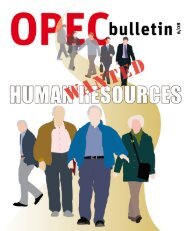2005 - OPEC
2005 - OPEC
2005 - OPEC
Create successful ePaper yourself
Turn your PDF publications into a flip-book with our unique Google optimized e-Paper software.
Brussels on 9 June, including the first joint roundtable in Vienna on 21 November when recent<br />
oil market developments and future prospects were addressed.<br />
It is recalled that this Dialogue is seen by the EU as part of a broader approach to strengthen<br />
energy relationships with the main oil and gas suppliers, and by <strong>OPEC</strong> as a significant further<br />
step in its continued efforts to enhance understanding and cooperation among oil producers<br />
and consumers. They emphasised once again the importance of maintaining the dialogue<br />
when prices are low, as well as high. Both sides recognise the importance of an effective<br />
framework enabling an exchange of views on energy issues of common interest, and the<br />
potential this has for contributing to stability, transparency and predictability in the interna-<br />
tional oil market.<br />
Participants at today’s meeting reviewed the report from the first joint roundtable on oil market<br />
developments, welcoming the constructive nature of the exchange of views and information,<br />
and discussions, and recognising two identified areas of mutual interest for further reflection,<br />
namely the refining sector and financial markets. In this connection, they recommended that<br />
a study on refining could be undertaken and that a workshop on the financial markets, with<br />
broad participation, could be organised, following further preparatory research work.<br />
The participants, while expressing concern about continued oil market volatility, welcomed the<br />
moderation in oil prices in recent weeks. They acknowledged the positive impacts of <strong>OPEC</strong>’s<br />
actions to raise output, as well as to implement costly investment plans to accelerate the ex-<br />
pansion of crude production capacity. They reiterated the importance of market stability and<br />
reasonable prices for both producers and consumers, for the world economy at large, and<br />
especially the economies of the developing countries. In this connection they recognised that<br />
extreme prices, in either direction, over a sustained period are potentially damaging and,<br />
therefore, not desirable. The participants confirmed not only the importance of mobilising<br />
investments both in the upstream and downstream, and ensuring adequate spare capacity<br />
and stocks, but also the need to reduce the uncertainties associated with the level of future<br />
oil demand.<br />
Publication by <strong>OPEC</strong> and other producers of information about their investment plans in up-<br />
stream and downstream was welcomed as a further means of contributing to market stability,<br />
as would greater clarity in the demand outlook. They also acknowledged that actions on the<br />
part of both the EU, through the strong support for the emergency oil stocks release within the<br />
IEA mechanism, and <strong>OPEC</strong>, by making available to the market its spare capacity of around 2<br />
mb/d for a period of three months as of 1 October, should it be called for, amongst others, had<br />
helped calm markets after the devastation caused by Hurricanes Katrina and Rita in the US. They<br />
2



